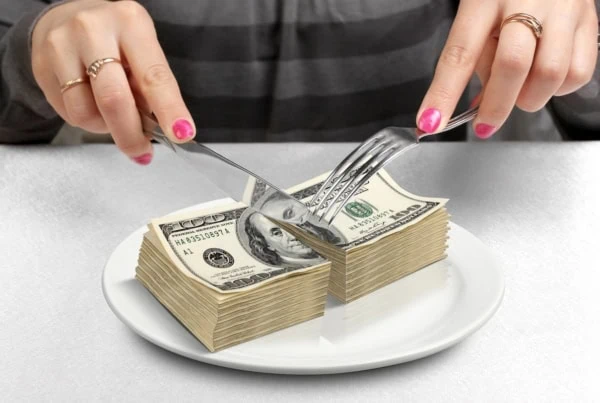Payday loans are quick and easy to get, but does that mean you should use them when you need money?
It’s not an easy question to answer. In fact, the very subject of payday loans is controversial. Many people want them banned (in the states that haven’t already banned them). But at the same time, some cash-strapped consumers see them as their only option sometimes to make ends meet—according to a 2022 Consumer Financial Protection Bureau (CFPB) report, more than 12 million borrowers take out payday loans each year.
Today, I’m going to discuss several of the key questions people tend to ask about payday loans. For instance, are the interest rates on payday loans fixed or variable? What type of interest rate is standard with payday lending? How exactly do payday loans work? And why do many people consider them predatory?
I’ll answer the questions above, provide alternatives for those who need money but are wary of payday loans, and more.
What Are Payday Loans?

Payday loans are short-term loans, for small amounts of money, with high interest rates.
Typically, payday loans are only made for two weeks, giving the borrower enough time to receive another paycheck and repay the loan. They’re also small—the average payday loan is for around $500 or less and is meant to tide the borrower over rather than fund a major purchase.
When a payday loan is approved, the borrower either receives cash on the spot or money directly deposited into their bank account within a day or two. The borrower later gives the lender a check for the amount due, or access to their bank account to directly withdraw the agreed-upon amount when the loan is due.
Borrowers with bad or even no credit can get a payday loan, and those are the types of borrowers payday lenders usually target. The lender doesn’t take into consideration how likely you are to be able to pay on time.
To qualify, you just need a bank account in good standing, a form of identification, and proof you have an income source, such as a pay stub. There are no credit checks or additional questions.
Related: 7 Best High-Dividend ETFs for Income-Hungry Investors
What Is the Difference Between Fixed and Variable Interest?

When you take out debt, you not only have to pay back that debt, but interest as well. But not only does the amount of interest vary from product to product—whether that interest moves or stays level also differs. For instance, many loans, such as auto loans, have fixed interest rates; other products, like credit cards, typically have variable interest rates; and still other types of debt, such as student loans, can carry fixed or variable rates, depending on your agreement with the lender.
Let’s look at these two types of rate structures, and what they mean:
Fixed Interest Rate
A fixed interest rate means the rate your charged won’t change over the life of the loan. If you sign up for, say, a 5% rate, it will remain 5% no matter what happens with the benchmark interest rate that was used to determine your loan’s rate.
A fixed-interest-rate loan is typically the best option because you’ll know from the start what your monthly payment will be. Also, if benchmark interest rates go up during the life of your loan, you’ll end up saving money.
Variable Interest Rate
With a variable interest rate, the interest rate you pay will change based on fluctuations in the benchmark index rate. Thus, your loan’s rate might increase or decrease.
Usually, a variable-rate loan starts out with a lower interest rate than comparable fixed-rate loans, which is why borrowers tend to opt for them. But that can change quickly. And the longer you hold variable-rate loans, the riskier this type of debt becomes, because there is more potential for the rate to increase.
Related: 10 Best Fidelity Funds to Buy
So, Are Payday Loans Fixed or Variable Rate?
Payday loans have fixed interest rates—your rate remains the same over the short duration of the loan. But unfortunately, as discussed below, those fixed rates tend to be fixed at very high levels.
How Do Payday Lenders Make Money?

Payday loan fees are extremely high, in the range of 10% to 30%. That means they cost about $10 to $30 for every $100 you borrow. But remember: These are very short loans, so that translates to extremely high annual rates. From the CFPB: “A typical two-week payday loan with a $15 per $100 fee equates to an annual percentage rate (APR) of almost 400 percent.”
But one-time loans that get paid back on time aren’t how these lenders make most of their money. Payday lenders make much more if you can’t pay on time and need a rollover loan. If you roll over a loan, you only pay the interest due upfront, and are then charged another interest fee and still owe the whole original balance. This pattern can get people into deep payday loan debt.
Let’s say you have a loan of $375 at a 15% rate, which, remember, is on the lower end of the spectrum for payday loans. You would get charged $56.25 and owe $431.25. But if you don’t repay the money within two weeks and need to roll over the debt, in addition to paying the $56.25 in interest, you would get charged another $56.25 while still owing the original $375.
In that situation, the payday lending company has made more than $112 from you that month. The more you roll over, or “renew,” the loan, the more the amount owed snowballs. Of the 32 states where payday lenders operate, 16 have laws requiring lenders to offer “no-cost” payment options, in which the borrower is allowed to repay the principal and interest they owe over several months, without renewing the loan and incurring more interest costs.
However, according to research by the Consumer Financial Protection Bureau, few borrowers benefit from those state protections.
Related: 9 Best Fidelity Index Funds to Buy
Are Payday Loans Secured?
No, a payday loan is an unsecured personal loan. Lenders can’t seize your property if you default. They do, however, have access to your bank account if you authorize it. (Note that you can withdraw this authorization, or tell your bank not to process a withdrawal by a payday lender.)
The payday lender might cause your bank account to overdraft, which at some banks means you would have to pay an overdraft fee.
In some situations, the payday lender might send the unpaid debt to collections or sue over outstanding balances.
What Happens If You Can’t Repay a Payday Loan?
The payday lender will cash the check you’ve given or draw money from your bank account when it is due. If the check bounces, they will try again. Depending on your bank, you might be charged an overdraft fee each time.
Consumers who know they can’t pay back the money (with interest) by the due date can ask the payday lenders to “roll over” the loan. In states where this is permitted, the payday loan borrower pays the interest due and the loan is extended. Just note that the interest keeps growing at high rates. The overall amount due can rise significantly when a loan is extended. The average payday loan might charge $15 per $100 borrowed, which equates to an annual percentage rate (APR) of nearly 400%.
Eventually, if you can’t pay your loan, the payday lender might send your debt to collections or sue you for the outstanding charges. But payday lenders can only garnish your wages with a court order. And you can’t be arrested for defaulting on a payday loan.
Related: The 10 Best Vanguard Funds to Buy for the Everyday Investor
How Are Payday Loans Regulated?
On a federal level, payday loan regulations tend to change depending on the current administration. The Consumer Financial Protection Bureau created several regulations in 2017 to protect borrowers, but many of these were revoked in 2020.
Still, there are some safeguards in place, according to nonprofit InCharge Debt Solutions, including:
- Lenders can’t take a borrower’s car as loan collateral.
- Lenders can’t make a payday loan to consumers who already have short-term debts.
- Lenders must disclose the principal payoff option to borrowers.
- Lenders can only extend loans to borrowers who have paid at least a third of the principal owed on every extension.
- Lenders can’t keep trying to take money from borrowers’ bank accounts if the funds in the account are insufficient to repay the loan.
There are also special protections for active duty service members and their dependents through the federal Military Lending Act. Payday lenders have a 36% cap on how much they can charge active service members, plus a few other limitations.
At the state level, payday loans are only available in 32 states. In some states that allow payday loans, there are caps on the interest rate lenders can charge (though these rates are still extremely high). Other states have no cap. For example, in 2022, Idaho had the highest average rate on payday loans, at a staggering 652% APR.
Related: 7 Best Schwab Funds to Buy
What Are Some Payday Loan Alternatives to Consider?
If you’re not comfortable with the idea of payday loans, here are a few alternatives you might tap instead.
Credit Card Cash Advance
A credit card cash advance lets you borrow money against your credit card’s line of credit. You can withdraw cash through an ATM or at a financial institution, up to your credit limit.
The money you withdraw is added to your credit card balance and can come with fees and a higher APR than your regular credit card purchases. The APR might be twice as high and you might start accruing interest immediately.
While a credit card cash advance shouldn’t be your first line of defense, the interest rates can still be lower than those of payday loans, and cash advances give you more time to pay the money back.
Side Hustles
Sometimes, it’s better to make some quick cash than to borrow it. You could take on just a few temporary jobs or start a longer-term side hustle to help build a strong emergency fund.
Apps like TaskRabbit and Handy are great ways to find some odd jobs to make fast money. If you have reliable transportation, there are many ride-share and delivery services you can try. You could also work informally for friends and family, doing jobs such as lawn work or babysitting gigs so the parents can get out for date nights.
If you live in a smaller town where there isn’t much work available, check online for side hustles. You may be able to do some data entry, transcription work, or other online jobs.
Personal Loans
Personal loans come with better interest rates than a payday loan and can help you build a credit history.
Payday lenders usually don’t report your loan to any credit bureaus, so they don’t improve your credit score, even if you pay the full amount due on time. Credit bureaus only learn about payday loans if they get sent to collections, which can really hurt your credit score.
As an added benefit, building or improving credit through personal loans can make it possible for you to qualify for loans with better terms in the future. You also have more time to pay back personal loans than you do with short-term payday loans.
If you don’t qualify for your own personal loan, you can still get one with a cosigner. Ideally, the cosigner has excellent credit so that you can secure a lower interest rate.
In the event you don’t pay back the personal loan, your cosigner has a financial responsibility to repay it, and that might negatively affect their credit score, so only use this option if you’re confident you can pay back the loan.
Ask a Friend or Family Member for Help
While it might feel awkward, borrowing money from friends or family can help you get back on track much more easily than by taking out loans with high interest rates.
You could ask for an interest-free loan as a favor, or you could promise to repay the loan with interest. If you’ve done favors for people in the past, financial or otherwise, they are more likely to be willing to return the favor now. Just stick to a realistic agreement of how much you will borrow and when you will pay it back.
It helps if you are honest about how you will use the funds, or if you let your benefactor pay an expense directly so they know where the money is going. Some people who may say no to lending cash may say yes to directly paying a bill that is due.
Live Within Your Means
This is the most fundamental way to stay out of high-interest debt and improve your overall financial wellbeing.
Payday loans might make sense to cover emergencies, but most borrowers use them for regular expenses, such as rent or car payments. So if you’re struggling to keep up with those payments, rather than turn to a payday loan, it’s better to downsize to a smaller apartment or use public transportation for a while.
Never use a payday loan for luxuries. If you’re in a situation where you need more money, first see if there is a way to cut back on expenses, or at least delay incurring them. For example, taking out a payday loan for a vacation means you’ll be paying far more for the vacation in the long run than if you waited, saved and paid for your trip with cash.
Try only buying what you can pay for with the money you have in your bank account right now.
When budgeting where your money goes each month, include contributions to an emergency fund. That way, if times get desperate, you have a stash of cash you can draw on instead of taking out a high-interest loan. And if you don’t need that money, it can work for you, earning interest in a range of high-yield savings options.
It isn’t always easy, but if you can stick to these principles now, your future self will thank you for your financial discipline.








